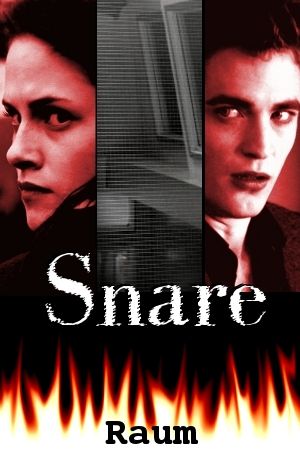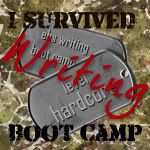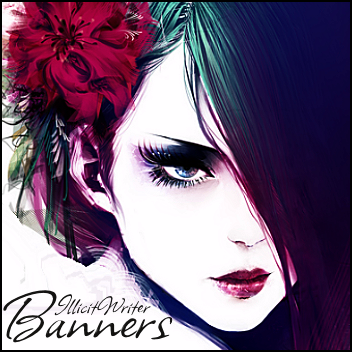She's the awesome author of greatly admired stories, such as Dead on my feet; she's a great beta-reader and she's contributed to MyReadingLounge's Writing Lab with a very inspiring article about The opening hook of a story. Today's guest is Cesca Marie.
Raum: The theme of illness is very relevant in your main story, "Dead on my feet", and the hospital setting, with particular attention to the childhood, is present also in your oneshot "And so this is Christmas." You presented both the patient's and the paramedics' POV. Would you like to tell us more about this choices?
Cesca Marie: For the last couple of years I've mainly been writing about disability and chronic illness, trying to represent it in an honest way that didn't sugarcoat or elicit pity. I also have a thing for medical fiction and memoirs (Bloodletting and Miraculous Cures by Vincent Lam, The Burn Journals by Brent Runyon, Gimp by Mark Zupan, A Nurse's Story by Tilda Shalof, etc.), which contributed a lot to "Dead On My Feet" and "And So This is Christmas." I pulled a lot of Edward's attitude both from my own feelings about going through adolescence in a spinal brace, and from a girl I met while travelling who has since died of cancer. That said, it was the first time I've written about cancer. My older stories (most of them aren't online anymore; the quality of the writing was too poor) included characters who were blind, d/Deaf, severely autistic, and mentally ill, but this was the first time I was going to write about a condition that was life-threatening. I chose to write about remission rather than the disease itself, because it's such a fascinating time: you're not ill but you look it; you don't feel that great, and people are happy for you but don't know how to deal with the fact that you're not magically back to your old self. Cancer isn't just a prolonged case of the flu -- it changes everything. A whole new identity has to be forged, and I find that fascinating, especially because we don't talk a lot about how to deal with situations like these in Western cultures. I still receive emails from the friends and relatives of people with cancer asking for information and recipes. The result is that I plug Elise Mecklinger's Goes Down Easy a lot, among other cookbooks. Some readers ask advice for how to give emotional support to a sick person, and it saddens me that something as common as chronic and/or acute illness is still such a taboo subject -- I really hope that one day people will have a more personal resource to turn to than the click-and-point PM button on my profile. Odds are, we're all going to need a resource like that at some point in our lives.
R: Who is your favorite character in the saga and why?
CM: I like Charlie. He has some less-than-admirable moments, but for the most part he reminds me of my dad. Not very talkative, but a deep thinker.
R: In "The Hideaway" and in "Dead on my feet" your Bella is ironic, sarcastic and sometimes also naughty. Would you like to tell us more about the way you developed this character?
R: In "The Hideaway" and in "Dead on my feet" your Bella is ironic, sarcastic and sometimes also naughty. Would you like to tell us more about the way you developed this character?
CM: In "The Hideaway" Bella is little more than a teenager with an attitude problem. She resents the stagnant nature of her home life, thinks she knows something about the world, and like most teens, is bitter about problems she doesn't have. She matures a little bit in that story, but in the beginning her belligerence was fun to write.
With "Dead On My Feet" Bella, things were a little more complex simply because the story was longer and she had more of an evolutionary arc. She begins in a place where she's trying to better herself, keeping everyone at arm's length, and in no way inclined to befriend another cancer patient. Her issues come out slowly--even slower than do Edward's. Initially readers struggled with that because they were eager to see Bella and Edward in a relationship, but it just wasn't realistic to have them pour out their deepest secrets, regrets, and insecurities within a week of meeting.
R: Both your Edward and your Bella have OOC elements. In "Dead on my feet" Edward is neither a fascinating vampire, nor an extraordinary handsome young man, as he's usually described in AH stories. You also chose a difficult subject for the story. How do your readers react? Can you describe the relationship you established with your readers?
R: Both your Edward and your Bella have OOC elements. In "Dead on my feet" Edward is neither a fascinating vampire, nor an extraordinary handsome young man, as he's usually described in AH stories. You also chose a difficult subject for the story. How do your readers react? Can you describe the relationship you established with your readers?
CM: The fun of OOC in "Dead On My Feet" is that it's superficial. You're right, Edward isn't a vampire and he isn't good looking enough to stop traffic, but he and canon-Edward have a few things in common. They're outsiders, over-reactors, sometimes bitter, hopeless romantics, at odds with the masses, part of a loving family, and committed to their relationships. That said, the superficial element did turn a few people off initially, I think. It's not easy to picture Edward without his trademark wild hair. They understood why the change was necessary, of course, but the "cancer story" isn't going to have universal appeal.
My relationship with my readers changed a lot over the course of the story. I wasn't expecting it to become so popular. Before "Dead On My Feet," I was happy if a story got 50 reviews over a period of 6 months, so in a lot of ways I wasn't prepared for the attention it would get or the amount of time I should have to spend interacting with readers instead of writing. Most of the initial response was positive, but as weeks went by and the story darkened I received a lot of hate mail, and even some commentary from people who hadn't read the story but had to throw their two cents in based on hearsay. It's not always easy to shake off the negativity, but I managed to stay focused and finish the story the way I wanted to. One reviewer for the story's last chapter remarked on the way that I didn't ask the audience to become co-writers. I hadn't thought about it until she said something, but she had a point. Some writers like to play to the desires of their audience, and some just want to be storytellers. To each their own. I just happen to prefer the non-democratic model; the choice of the readers begins and ends with which stories we choose to consume or pass over. It's better that way--just look at the platypus; see what happens when things are designed by committee?
R: Would you like to describe your writing process? How did it change during the time you have spent in this fandom?
R: Would you like to describe your writing process? How did it change during the time you have spent in this fandom?
CM: My writing process usually starts with a single line, and then everything else falls into place. For "The Hideaway" it was "You survived Prohibition. I'm sure you can think of something." Once I have a good grip on the tone, I can write the rest. I like to have the whole story conceptualized early on, but will settle for not knowing the ending until I've written a little more. Other than that, all I need is a wall to put my back to (people reading over my shoulder is by far my biggest pet peeve) and my laptop.
The only difference in how I normally write and how I wrote "Dead On My Feet" is that I didn't take many breaks. The story was composed in blocks of ~8k words per week, so I had to be on the ball.
R: You are also a Beta reader. Did your experience as a Beta influence your writing process and your stories?
CM: It doesn't, really. I'm very picky about what I take on in terms of beta projects. If a story's synopsis or outline doesn't capture my interest, I know I won't do a good job beta-ing it. I'll lose interest. I'll be tempted to skim. Providing low-quality beta services doesn't appeal to me, so I end up turning down a lot of requests. And to a certain extent, there are things that a true writer will learn independently. If a person really, truly wants to be a writer, (s)he'll own a style guide and grammar book. (S)he'll examine the market/fandom for what's hot, what's not, and what's been done to death and resurrected in sequel form. A beta reader can't teach these things, but a writer who wants to know them and is actively seeking answers will often produce a compelling story. Attitude counts.
R: In "The Hideaway" Edward says: "Dreams are some of the best things about being human. You get to change and develop…to become instead of just be." Could it be a trait d'union among your stories, at least among "The Hideaway" and "Dead on my feet"?
CM: You're probably right. Both stories deal with characterization and personality in very close proximity, so personal development is a ready-at-hand theme. I guess that sort of makes the stories bildungsroman in a technical sense, but it is only fan fiction.
Thank you, Cesca Marie! I made a blinkie for Cesca Marie's story "The Hideaway." Here it is!

If you read these fanfics, please don't forget to tell the author that "Raum sent you" and say "Ciao!" from me! Thanks!



























Hi Lady.Wight
ReplyDeleteYou can check this website:
http://www.abriamattina.com/wake/recipes/
- Raum
Hi Raum,
ReplyDeleteI was recently reading Dead on my Feet and was about to finish, only 50 pages or so left, when suddenly the online source that had Cesca's story stopped working and now I'm going crazy trying to find an alternate source but can't find it! Waaahhh. Do you have any idea where I could find it?
I have a mobi version for the Kindle which you can have. My email is
ReplyDeletepaulinejon@aol.com